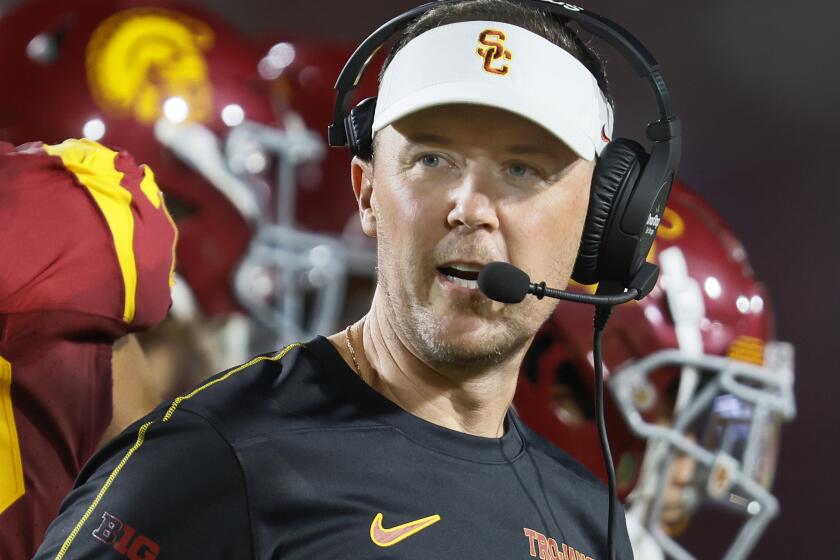Road to recovery
In his small, sparsely furnished office in Heritage Hall, Dave Watson rises from his desk chair, reaches to the top of a cabinet and grasps a vintage Brett Favre bobblehead figurine.
The keepsake has seen better days, but it reminds USC’s defensive line coach of Favre’s toughness, grit and love for football, qualities Watson adopted during his own playing career.
Favre’s effort to overcome substance abuse also inspired Watson.
In 1996, the future Hall of Fame quarterback entered a drug treatment facility seeking help for a dependence on painkillers that was brought on by injuries and numerous surgeries.
In June, in the aftermath of an arrest for suspicion of driving under the influence of prescription drugs, Watson did the same at the urging of Coach Pete Carroll.
“The best thing I ever did was admit I have the disease of addiction,” Watson said during a recent interview.
Watson, who returned from a leave of absence in July, says he no longer is dependent on painkillers such as Vicodin or muscle relaxants such as Soma, which he had used to cope with the aftereffects of five surgeries and back and neck conditions that resulted mainly from playing football.
During training camp last month, the married father of two exhibited a lighter step as he raced across the practice field, his trademark enthusiasm unwavering as the Trojans prepared for the season.
“He’s operating at his very best,” Carroll said. “It’s great to see him feeling good.”
Watson, 32, acknowledges that his recovery is ongoing. He agreed to be interviewed for this story, he said, because he hopes it might inspire others struggling with addictions to painkilling medications to seek help.
“I know it’s more widespread in society than people would like to admit,” he said. “Because it’s in society, it’s in football.”
Watson, a Minnesota native, joined USC’s staff in 2005 as a graduate assistant and was hired full time before the 2006 season. Known to players as “Coach Sweaty” for his prodigious perspiring, he sprinted to the ball during drills as if he were still playing college football.
“I only know one way -- lead by example,” he said.
But Watson’s hustle belied the pain.
Watson began playing football at age 7. The former defensive end was accustomed to playing hurt by the time he reached high school.
“I didn’t know the difference between hurt and injured,” he said. “I didn’t want to miss anything.”
Watson’s reliance on painkillers began to take root in college at Western Illinois, where he transferred after suffering knee and foot injuries at Minnesota.
“It was never, ‘Oh my gosh, this stuff is highly addictive and I could be tempted by it,’ ” he said. “It was just, ‘Whatever it takes to help the team.’ At all costs.”
Once, he said, a trainer at Western Illinois told him he should stop playing football, that he could die if he were hit in the neck the wrong way.
“And I said, ‘Well, where else would I want to die?’ ” Watson recalled.
After his playing days ended in 1999, Watson said he checked himself into a rehab facility and weaned himself off painkillers. But later, while working construction, he suffered back and knee injuries when a ladder slipped out from under him.
Once again, the painkiller cycle began.
Watson was hired as a graduate assistant at Southwest Minnesota State before moving to Michigan State and then USC.
“I never told my [fellow] coaches,” Watson said. “I never told anyone anything because you don’t want to be a high-maintenance guy in the football industry.”
He had no choice after his arrest.
Watson said he was still struggling emotionally over the death of a cousin when he was involved in what a police official described as a minor collision on May 17 in El Segundo.
Driving home from the grocery store, Watson said he accidentally hit the back of another vehicle, thinking the driver ahead of him would try to make it through a yellow light at an intersection on Sepulveda Boulevard.
He was arrested and booked on suspicion of driving under the influence. A police official said no alcohol was involved in the incident. A hearing is scheduled for Sept. 25.
After the incident, Watson spoke at length to Carroll, who told the assistant he needed to accept help.
“Coach said, ‘I’m not telling you as your boss. I’m telling you as a friend. I don’t care if you ever coach again,’ ” Watson said.
Carroll contacted an intervention specialist who arranged for Watson to be treated at an in-patient facility in Southern California. Watson went through withdrawal but said he gradually felt better with the help of exercise and counseling sessions that helped him recognize that part of his dependence stemmed from emotional and genetic issues.
Since his return, Watson has remained in daily contact with the interventionist, who offers support and guidance.
“You’ve got to reshape pretty much everything about the way you think, and that takes time,” said the interventionist, who agreed to be interviewed but asked that his name not be used because of the sensitive nature of his work. “Just like it takes time to build a habit, it takes time to develop new habits.
“He’s dealing emotionally on a different level right now. He’s trying to grow up a bit and figure out how to do life head-on instead of numbing it up.”
Watson says he has received phone calls from several former athletes and others who have contacted him to offer support and to inquire about his experience and treatment.
“The only thing that’s changed is that I’m going to be a better father, a better husband and a better coach,” Watson said.
“I’m fortunate to have gone through it and learned so much.”
--
Go beyond the scoreboard
Get the latest on L.A.'s teams in the daily Sports Report newsletter.
You may occasionally receive promotional content from the Los Angeles Times.




